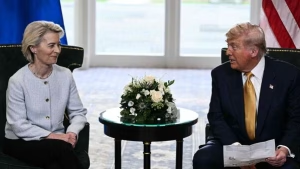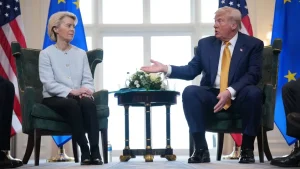Washington D.C. – The Trump Trade Deal With EU has emerged as a landmark agreement that fundamentally reshapes transatlantic commerce. After intense negotiations at Trump’s Turnberry golf resort in Scotland, the United States and European Union successfully reached a comprehensive trade arrangement that averts potentially devastating economic consequences while establishing new frameworks for bilateral cooperation.
Historic Agreement Prevents Trade War

The Trump Trade Deal With EU represents a crucial diplomatic victory, preventing the implementation of threatened 30% tariffs that could have triggered a devastating trade war. President Donald Trump and European Commission President Ursula von der Leyen announced the breakthrough agreement just days before the critical August 1 deadline, when punitive measures would have automatically taken effect.
This last-minute resolution demonstrates the strategic importance both sides place on maintaining robust economic relationships. The Trump Trade Deal With EU establishes a uniform 15% tariff structure across all European exports to the United States, creating predictable trading conditions for businesses on both continents.
Comprehensive Tariff Structure Established
Under the Trump Trade Deal With EU, American importers will face standardized 15% duties on all European goods, including automobiles previously subject to 25% levies. This significant reduction provides substantial relief for automotive manufacturers and consumers while maintaining protective measures for domestic industries.
President Trump emphasized the fairness principle underlying these negotiations, stating that longstanding trade friction between America and Europe centered on achieving equitable arrangements. The Trump Trade Deal With EU addresses these concerns by implementing consistent tariff rates that mirror agreements recently concluded with Japan and other trading partners.
The standardized approach ensures American businesses can better predict import costs, facilitating more effective supply chain planning and inventory management. European exporters similarly benefit from clarity regarding market access conditions, enabling strategic business decisions based on reliable cost structures.
Also Read: Kargil Vijay Diwas: Historic 26th Anniversary Honors 545 Fallen Legendary Heroes
Massive Energy Investment Commitment
The Trump Trade Deal With EU includes unprecedented energy cooperation provisions worth $750 billion in European purchases of American energy products. This enormous commitment represents one of the largest international energy agreements in modern history, positioning the United States as a primary supplier for European energy security needs.
European leaders recognize the strategic value of diversifying energy sources, particularly given recent global supply chain disruptions and geopolitical uncertainties. The Trump Trade Deal With EU energy component strengthens American domestic production while providing Europeans with reliable, long-term energy security through established partnerships.
American energy producers stand to benefit enormously from guaranteed European demand, creating opportunities for expanded production capacity, job creation, and technological innovation. The agreement spans multiple energy sectors, including natural gas, oil, and renewable energy technologies.
$600 Billion Investment Pledge


Beyond energy commitments, the Trump Trade Deal With EU encompasses $600 billion in new European investments across American markets. This substantial capital infusion will support infrastructure development, manufacturing expansion, and technological advancement throughout the United States.
European companies gain enhanced access to American markets while contributing to domestic economic growth through direct investment. The Trump Trade Deal With EU investment provisions create mutual benefits, allowing European businesses to establish stronger American market presence while generating employment and economic activity for American communities.
These investments span diverse sectors including manufacturing, technology, healthcare, and infrastructure development. The agreement establishes frameworks for streamlined approval processes, ensuring efficient deployment of European capital into productive American economic activities.
Global Trade Framework Transformation


The Trump Trade Deal With EU forms part of broader American efforts to restructure international trading relationships. Six nations, including Britain, Vietnam, Indonesia, the Philippines, and Japan, have concluded similar agreements with the Trump administration ahead of the August deadline.
This coordinated approach demonstrates American commitment to replacing multilateral free trade frameworks with bilateral arrangements that address specific national interests. The Trump Trade Deal With EU serves as a template for future negotiations, establishing precedents for tariff structures, investment commitments, and energy cooperation.
Market Stability and Business Predictability

US Commerce Secretary Howard Lutnick emphasized the finality of negotiated agreements, stating that no extensions or grace periods would be granted beyond the August 1 deadline. This definitive approach provides businesses with clear timelines for implementing new trading arrangements under the Trump Trade Deal With EU.
European Commission President von der Leyen highlighted the stability and predictability benefits these agreements provide for businesses operating across the Atlantic. The Trump Trade Deal With EU eliminates uncertainty that had disrupted investment planning and supply chain management for months.
Financial markets responded positively to the agreement, recognizing that avoided trade conflicts preserve economic growth prospects for both regions. The structured approach to tariffs and investments creates foundation for sustained commercial relationships.
Strategic Implications for Future Relations
The successful conclusion of the Trump Trade Deal With EU demonstrates that intensive negotiations can produce mutually beneficial outcomes even when initial positions appear irreconcilable. Both sides achieved core objectives while avoiding economically destructive alternatives.
This agreement establishes new precedents for American trade policy, emphasizing bilateral negotiations over multilateral frameworks. The Trump Trade Deal With EU success may influence future diplomatic approaches with other major trading partners, creating templates for resolving complex commercial disputes through direct engagement and compromise.

